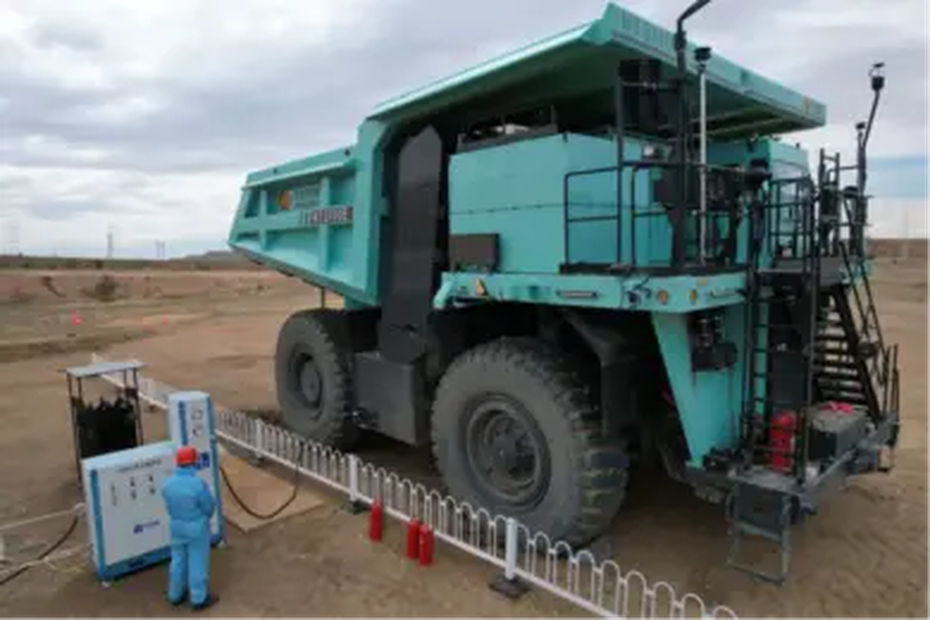
But the longer it takes to prove out the performance of all-battery trucks in real mining fleets, plus the more the industry adopts diesel-battery hybrids in the interim, attention is set to return to hydrogen-based hybrids, especially if governments in major mining hubs support growth of and investment in green hydrogen ecosystems – Chile’s mooted hydrogen valleys being a good example.
To date the best known FCEV large rigid mining trucks are the nuGen™ Haulage Solution based on a Komatsu 930E and designed and built by First Mode in partnership with Anglo American; and Fortescue’s Europa, based on the Liebherr T 264. General Motors and Komatsu are co-developing a hydrogen fuel cell power module for Komatsu’s 930E electric drive mining truck. There have been other attempts – such as the HYDRA project in Chile, which got as far as a stationary powertrain prototype that was run at Centinela but never installed on a truck.
In terms of actual running mining trucks, the other hotspot has been China. Weichai, better known as an engine supplier, built a 200 ton class FCEV truck as far back as 2019 working with CRRC Yongji but it was never commercialised. Inner Mongolia North Hauler (NHL) has built the 150 ton class NTH150 which is still in testing at Huolinhe coal mine. Earlier this year coal mining giant CHN Energy, leading Chinese mining equipment OEM XCMG and hydrogen fuel cell supplier THIKO New Energy held a signing ceremony for development of a 240 ton class FCEV mining truck to be deployed at the Baorixile coal mine of CHN Energy. These are all rigid trucks, but there are numerous FCEV examples in wide body trucks in China as well.
The latest rigid truck project to get off the ground is at CHN Energy’s Shenhua Beidian Shengli Energy Co Ltd, better known as the Shengli mine, in Xilinhot, Inner Mongolia, where a 110 ton class truck known as the HT3110E built by Aerospace Heavy Industry (AHI), part of China Space Sanjiang Group (CSSG), is now in test operation. This FCEV uses hydrogen fuel cells supplied by Reshape Energy.
It is equipped with a 70MPa hydrogen storage system and the truck can reach a maximum speed of 50 km/h under heavy load conditions. Reshape Energy says its independently developed fuel cell system has the advantages of strong load capacity, long service life, and high safety. The average operating altitude is about 1,000 m at Shengli with a big temperature difference between winter and summer ranging from -25°C to 30°C. Reshape Energy cooperated with AHI to improve the vibration resistance and heat dissipation performance of the fuel cell system. The truck can reduce diesel consumption of 320,000L per year equating to over 230 tons of carbon emissions.
Not only that but the truck is being operated autonomously – one of the first if not the first FCEV to do so – using autonomous haulage technology supplied by one of China’s AHS leaders, TAGE Idriver. The hydrogen fuel cell driverless heavy-duty mining dump truck project was included in the ‘1025’ project of the State-owned Assets Supervision and Administration Commission (SASAC) of the State Council. Currently, the hydrogen energy mining truck has achieved full-load trial operation and has been run autonomously for over 600 km.
The truck has a total hydrogen storage capacity of 5,052 litres with a system weight of 203 kg and combines four 140 kW hydrogen fuel cell modules with a lithium iron phosphate battery for total power output of 900 kW. Liu Xi, Director of the Shengli Energy Mechanical and Electrical Information Center says of the truck project: “This is to adapt to the special working environment of the northern open-pit coal mines, which have long winters and mostly extremely cold weather. Hydrogen fuel cells are used in extreme climates such as extreme cold and wind and snow in the north. It can continuously provide heat under certain conditions, and at the same time only generate water during driving. It can also work continuously for a long time, enabling high-intensity operations of more than 20 hours a day in mines.”